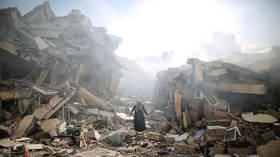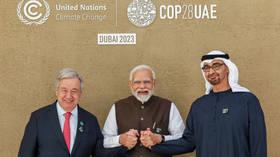How the Global South is rediscovering centuries of shared history to challenge Western domination
India’s history with Africa goes back several centuries when Indian traders traveled to the eastern coasts of the continent using the monsoon winds. Immediately after gaining independence from the British in 1947, India, as one of the first decolonized countries, decided to spearhead the struggle for a more just global order.
While ‘the Global South’ is in the headlines of the media around the world today, few would recall that in April 1955, representatives from 29 governments of Asian and African nations that emerged from the yoke of their European colonialists gathered in Bandung, Indonesia to lay the groundwork for the formation of the Non-Aligned Movement (NAM).
In 1961, the first NAM summit in Belgrade drew delegates from 25 African, Asian, Latin American, and European countries under the leadership of Tito of Yugoslavia, Nasser of Egypt, Nehru of India, Kwame Nkrumah of Ghana, and Sukarno of Indonesia, to discuss the role of the Third World in the Cold War.
Over the decades, India has succeeded in holding on to its strong friendship with most African nations. Today, Africa draws more attention from New Delhi partly because of its camaraderie forged through shared experiences of economic development post decolonization.
However, as the rise of Africa would increase global multipolarity, it is also a strategic consideration for India. As the country seeks a leadership role in the Global South, it is important to have the African bloc as its ally.
India in Africa: Development projects and more
Under the framework of the Group of Twenty (G20) presidency, India hosted the final summit on September 9 and 10 in the presence of more than 40 world leaders, including the G20 heads of state or their representatives. One major outcome of the event, arguably the most significant, was that India successfully secured a permanent place in the G20 for the African Union (AU), the continental body of 55 member states.
The AU’s entry into the G20 will indeed provide India with another platform to engage with Africa on a continental level, but this cannot replace the framework of the India-Africa Forum Summit, which has been India’s key outreach program for Africa since 2008.
Indeed, New Delhi’s active engagement with the region was initiated in the early 2000s. The first India-Africa Forum Summit took place in 2008 in New Delhi and was attended by the governments of 14 African nations selected by the AU and India. India also hosted the second summit in Addis Ababa, the capital of Ethiopia.
The third summit was held in 2015 in New Delhi. This was the most extensive diplomatic outreach undertaken by the administration of Prime Minister Narendra Modi, which involved representatives from 54 African countries, 41 of which were presidents, including Robert Mugabe of Zimbabwe, Abdel Fatah el-Sisi of Egypt, Jacob Zuma of South Africa, and Muhammadu Buhari of Nigeria.
Since then, there has been a significant increase in senior Indian leadership visits to Africa, along with a greater emphasis on training and development assistance. The establishment of new embassies in 18 African countries in the past five years demonstrates the increased attention paid to Africa by New Delhi.
Similar to other powerful nations, India has included development partnerships encompassing both grants and concessional loans as a crucial instrument in its diplomatic arsenal – and it has accomplished this in the distinctive ‘India Way’.
In total, India’s development outreach globally since 2008 has expanded to 64 countries with 300 Lines of Credit (LOCs) for 540 projects. Out of these, 321 projects encompassing 205 LOCs are currently being implemented in Africa.
In recent years, these initiatives have been qualitatively expanded, particularly concerning the scale and complexity of the projects inside the LOCs.
Prominent initiatives funded by India include the construction of government buildings in Burundi and Ethiopia, sugar plants in Ethiopia and Ghana, cement production in Djibouti and the Republic of Congo, power plants in Sudan, Rwanda, Zimbabwe, and Malawi, water in Mozambique, Tanzania, and Guinea, and health in Cote d’Ivoire, Guinea, and Zambia. This steady growth in Indian interests in Africa is reflected in an expanded footprint and deeper engagement – 51 out of 54 nations of the continent host such development projects.
A more coordinated strategy and tighter supervision by the Exim Bank of India have also improved the efficiency of their planning and execution. Grant support provided by the government of India is distributed globally, encompassing nearly all developing regions, even more broadly than the LOCs.
An enhanced track record of project delivery has coincided with increased development aid offers. However, as the government does not make these impact analysis reports public, it is difficult to evaluate its overall utility.
In addition to its economic diplomacy, with the help of the International Day of Yoga, the International Solar Alliance, and most recently, the Coalition for Disaster Resilient Infrastructure, India’s branding has grown significantly.
At the same time, training collaboration under ITEC (Indian Technical and Economic Cooperation) involves over 10,000 Africans annually in subjects ranging from IT and public administration to election management, SME, entrepreneurship, rural development, parliamentary affairs, and renewable energy.
Two digital initiatives are also in pilot mode in Africa today – e-Vidya Bharati distance learning and e-Aarogya Bharati distance health. Going beyond mere cooperation, these initiatives reflect India’s growing leadership role in the Global South. To some Indian Ocean island states, India has supplied naval equipment, provided training, and undertaken hydrographic services.
The heart of the Global South revitalized
At the G20 summit this year, India unveiled several novel initiatives, including the Global South Center of Excellence, the Global South Science and Technology Initiative, the Global South Young Diplomats Forum, the Global South Scholarships, and Aarogya Maitri (Wellness Friendship). Even as the specifics of these measures are still being worked out, Africa – the ‘heart of the Global South’ – would undoubtedly benefit from these programs, adding an extra layer of support beyond that given to African countries under the framework of the India-Africa Forum Summit.
Since the latest summit in 2015, a lot has changed geopolitically, economically, and in terms of global priorities. In order to build on the successes of earlier summits and to cater to the needs of the evolving global landscape, it is imperative that India host the fourth summit.
In defining its policies at the continental, regional, and bilateral levels, India must contend with numerous differences while maintaining connections with all 54 African nations. It would be challenging to determine the course of policy toward the post-colonial states of Africa if one did not consider their diversity with regard to their colonial past, strategic importance, resource endowments, and degrees of socio-economic and technological development.
India and Africa’s relationship has developed naturally through cooperative methods. Currently, the main avenues for Indo-African cooperation are capacity-building programs, credit lines, grant support, development projects, technical consulting, disaster relief, humanitarian aid, and military cooperation.
However, the tale of India in Africa has not received the recognition it merits, partly because India doesn’t play to the gallery. Relationships with eastern African nations bordering the Indian Ocean, with which India has closer ties and a more extended history, are especially significant to the Indo-Pacific discussion.
India now has a noticeable presence in Africa and many other regions where ties were previously weaker. In fact, this kind of greater cross-continental communication together with substantial interaction, primes India for a global mindset.
As the world moves toward increasing multipolarity, India is prepared for the next stage of its own evolution. Given that India is once again at the center of world geopolitics, chairing summits, navigating difficult choices, and negotiating a seat at the high table of global governance, the time is opportune to convene the much-anticipated India-Africa Forum Summit.
*
Samir Bhattacharya, Doctoral Scholar at Jawaharlal Nehru University, New Delhi, and Senior Research Associate with the Vivekananda International Foundation.

 Samir Bhattacharya, RT, December 23, 2023 —
Samir Bhattacharya, RT, December 23, 2023 — 


